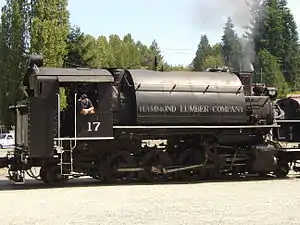Mount Rainier Railroad and Logging Museum
The Mt. Rainier Railroad and Logging Museum or MRRR, formerly the Mt. Rainier Scenic Railroad (MRSR), was a steam-powered heritage railroad operating in the U.S. state of Washington between Elbe and Mineral. The railroad traveled on trackage that passes through thick forest just south of Mount Rainier. The depot, gift shop and ticket office are located in Elbe. The train traveled to the Logging Museum exhibits located in Mineral. The MRRR ran its collection of vintage rail equipment over seven miles of track, part of Tacoma Rail's Mountain Division.
 A view of Mount Rainier from the railroad line | |
| Overview | |
|---|---|
| Headquarters | Elbe, Washington |
| Locale | Lewis & Pierce counties, Washington, U.S. |
| Dates of operation | 1980–2020 |
| Technical | |
| Track gauge | Standard 1,435 mm (4 ft 8 1⁄2 in) |
| Length | 7 miles (14 miles round-trip) |

The railroad had three steam locomotives, as well as a diesel locomotive in regular service, along with several other locomotives of both types. Most of the railroad's engines were geared steam locomotives. These specialized types of steam engines — Shay locomotives, Heisler locomotives, Climax locomotives, and a Willamette locomotive were used in the early 20th century for logging. Compared to conventional steam locomotives, geared locomotives were better-suited for the steep grades, sharp curves and uneven profiles of hastily laid track typical of logging operations. Thus, the MRRR sought to preserve and operate historic geared locomotives and related logging technology in order to present visitors with a sense of a bygone logging era critical to the development of the Pacific Northwest.
Prior to 2016, steam operations were run based on availability of volunteer operators, who comprised the great majority of railroad personnel. However after being purchased by American Heritage Railways in 2016, the railroad's operations are run by professional staff. The MRRR's regular schedule ran weekends from Memorial Day to late October, with special event Polar Express trains November through December. In May 2020, American Heritage Railways announced that the railroad would cease operations "for the foreseeable future" due to financial losses caused by the COVID-19 pandemic.[1]
History

The MRRR operated over track originating in Tacoma, on a route founded there over a century ago. In 1887, the Hart brothers constructed a short, 3 ft (914 mm) narrow gauge railroad originating at 46th Street in Tacoma, Washington.[2] In 1890, the railroad was reorganized by another interest as the Tacoma Eastern Railroad, at which time the tracks were converted to standard gauge and extended a distance of six miles. The railroad was acquired in 1900 by yet another group of investors who had financial interests east of Elbe, the Nisqually Coal Fields, thus providing the impetus to extend the Tacoma Eastern from Tacoma to the area where the MRRR runs today.[3] The route was also extended to access stands of virgin timber south of Mount Rainier, eventually reaching Morton.
Despite formal organization under the name Tacoma Eastern, the railroad was controlled by investors far from the Pacific Northwest. The Chicago, Milwaukee, St. Paul and Pacific Railroad, also known as the "Milwaukee Road", reputedly had control of the Tacoma Eastern as early as 1901.[3] In the 1890s, the Milwaukee Road's directors desired a connection from the Midwest to the Pacific coast.[4] The Tacoma Eastern was an appealing investment for the Milwaukee Road. The Tacoma Eastern remained a subsidiary of the Milwaukee Road, owned through stock interest only, until 1918 when the United States Railroad Administration coordinated the Milwaukee Road's absorption of all its subsidiaries into one unified system.
The Tacoma Eastern, though, continued to exist as an independent entity within the Chicago, Milwaukee, St. Paul and Pacific Railroad system, where it was known as the National Park branch. This segment of the system was one of the Milwaukee Road's most profitable lines.[3] As such, it was preserved amidst the Milwaukee Road's bankruptcy in 1980. The Tacoma Eastern was a viable carrier of lumber from stands of timber owned by the Weyerhaeuser Corporation, whose tracts of land still surround the MRSR today and provide commercial traffic on the line.
In the wake of the Milwaukee Road's 1980 bankruptcy, Tacoma lumberman Tom Murray, Jr., sought to open a portion of the line to tourists.[5] MRSR was then created by Tom Murray to operate historic equipment stored in Tacoma.[3] The Weyerhaeuser Corporation allowed the MRSR to operate its equipment on a seven-mile segment of the line from Elbe to Mineral. Weyerhaeuser maintained control of the track until 1998 when the corporation transferred control of all of its rail interests to the City of Tacoma, into what is now known as Tacoma Rail. This transfer of ownership did not affect the MRSR and its tourist operations, nor the availability of the route to commercial shipment. In mid 2016, due to decline and poor management, MRSR was sold to American Heritage Railways, which also owns the world renowned Durango & Silverton Narrow Gauge Railroad, rebranding the MRSR as the Mount Rainier Railroad and Logging Museum.
Locomotives
| Number | Builder | Type | Works Number | Built | Acquired | Image | Description |
|---|---|---|---|---|---|---|---|
| No. 2 | Willamette Iron and Steel Works | 3-truck geared steam locomotive | #34 | 1929 | 2002 | .jpg.webp) No. 2 under steam at Mineral, WA. |
Built for the J. Neils Lumber Co. in Klickitat, Washington; sold to Rayonier, Inc., in 1949 for operation in Sekiu, Washington until 1962; design closely resembles a Shay locomotive[6] the only operational Willamette in the world, also the final locomotive built by Willamette; currently operable. |
| No. 10 | Climax Locomotive Works | 3-truck Climax | #1693 | 1928 | 1979 | Built for Hillcrest Lumber Co. in Vancouver Island, British Columbia.; second to last Climax ever built; last Climax built to standard gauge; first operating steam locomotive on MRSR;[7] stored inoperable. | |
| No. 11 | Lima Locomotive Works | 3-truck "Pacific Coast" Shay | #3327 | 1929 | 1981 |  No. 11 laying partially dismantled in the "House of Gears" |
Built for Forest Lumber Co. of Pine Ridge, Oregon; sold to Pickering Lumber Corp. of Standard, California, in 1940; one of only five surviving "Pacific Coast" Shays;[8] stored inoperable. |
| No. 91 | Heisler Locomotive Works | 3-truck "West Coast Special" Heisler[9] | #1595 | 1930 | 1980 | .jpg.webp) No. 91 under steam, location unknown |
Originally No. 102, built for Whitney Engineering Co. of Tacoma, Washington, which was a locomotive dealer at the time; sold to Kinzua Pine Mills of Kinzua, Oregon, in 1930; donated to the museum by Tom Murray in the late 1970s.[10] Re-numbered by the Mount Rainier Scenic Railroad to No. 91 in honor of another 3-truck Heisler than formerly ran out of Mineral; stored inoperable. |
| ? | Heisler Locomotive Works | ? | #1252 | 1912 | ? |  On display next to the Elbe depot |
On display by the Elbe depot. It was operated by the Pickering Lumber Company and was known as "PLC #10"; MRSR has renamed it 'R.J. "Bud" Kelly"; on display. |
| No. 70 | Baldwin Locomotive Works | 2-8-2 | #55355 | 1922 | 1992 | .jpg.webp) No. 70 under steam at Mineral, WA. |
Built for Polson Brothers Logging Company of Hoquiam, Washington; purchased by Rayonier Corp. in 1945.[11] Retired and purchased from Rayonier by Maynard Lang in 1963, operated in Snoqualmie for the Puget Sound Railway Historical Association from 1966 until it was rendered inoperable in 1983. Sold to MRSR in 1992 after Lang's death. Restored to operable condition in 2011. Put out of service due to lead truck issues, returned to service in 2017; currently operable. |
| No. 45 | Baldwin Locomotive Works | 2-6-2 | #27311 | 1906 | 1998 | Built for Polson Logging Company of Hoquiam, Washington; purchased by Rayonier Corp. in 1945; the locomotive has been sold to a private owner. Polson Museum is the owner as of 2015;[12] stored Inoperable. | |
| No. 5 | H.K. Porter, Inc. | 2-8-2 | #6860 | 1924 | Early 1980s |  No. 5's distinct Vanderbilt style tender |
Built for the Carlton & Coast Railroad of Carlton, Oregon; one of the largest Porter locomotives ever built[13] Restored in the early 1980s and operated as MRSR's workhorse until 2003; stored inoperable. |
| No. 17 | American Locomotive Company | 2-8-2T | #68057 | 1929 | 1980 |  No. 17 switching in Elbe, WA. |
Built for the Crosset Western Co. in Wauna, Oregon; sold to Hammond Lumber Co. of Samoa, California, in 1942[14]. Purchased by MRSR in 1980 and operated from 1995 to 2011 until taken out of service for 1,472 day inspection and rebuild. Returned to service in 2013; currently operable. |
| No. 481[15] | General Motors Electro-Motive Division | EMD NW2 Diesel-electric | #5336 | 1942 | 2001 | Built for the Great Northern Railway; stored inoperable. | |
| No. 7012A[16] | General Motors Electro-Motive Division | EMD F9 Diesel-electric | #21108 | 1956 | 1982 | Built for the Northern Pacific Railway; currently operable | |
| No. 41 | American Locomotive Company | ALCO RSD-1 Diesel-electric | 69570 | 1941 | Damaged by grease fire in electrical cabinet and traction motor; stored inoperable. | ||
| No. 42 | American Locomotive Company | ALCO S-1 Diesel-electric | Stored inoperable. |
- All of the railroad's locomotives were serviced at the maintenance shops in Mineral, WA.
See also
References
- "Mount Rainier Railroad to Cease Operations for Foreseeable Future". Nisqually Valley News. May 19, 2020. Retrieved May 20, 2020.
- "Archived copy". Archived from the original on July 25, 2008. Retrieved March 14, 2009.CS1 maint: archived copy as title (link)
- Id.
- Tacoma Eastern Railroad
- "Archived copy". Archived from the original on April 7, 2009. Retrieved March 15, 2009.CS1 maint: archived copy as title (link)
- "Archived copy". Archived from the original on June 24, 2009. Retrieved March 16, 2009.CS1 maint: archived copy as title (link)
- "Archived copy". Archived from the original on November 21, 2008. Retrieved March 15, 2009.CS1 maint: archived copy as title (link)
- "Archived copy". Archived from the original on November 21, 2008. Retrieved March 13, 2009.CS1 maint: archived copy as title (link)
- "The Heisler Locomotive Project". www.nelsonslocomotive.com.
- "Archived copy". Archived from the original on November 21, 2008. Retrieved March 15, 2009.CS1 maint: archived copy as title (link)
- "Archived copy". Archived from the original on December 10, 2008. Retrieved March 15, 2009.CS1 maint: archived copy as title (link)
- "Archived copy". Archived from the original on November 21, 2008. Retrieved March 15, 2009.CS1 maint: archived copy as title (link)
- "Archived copy". Archived from the original on February 17, 2012. Retrieved March 15, 2009.CS1 maint: archived copy as title (link)
- "Archived copy". Archived from the original on November 21, 2008. Retrieved March 15, 2009.CS1 maint: archived copy as title (link)
- "Great Northern Empire - Then and Now". www.greatnorthernempire.net.
- "LocoPhotos.com - Photo Details". www.locophotos.com.
External links
| Wikimedia Commons has media related to Mount Rainier Scenic Railroad. |